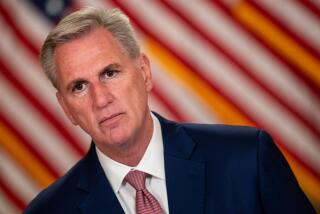Cotton Candy
- Share via
George Bush and Michael S. Dukakis both talk tough about federal budget deficits. But their proposed solutions are squishy, if not starry-eyed. This may make certain economists happy, for they tend to abhor the notion of candidates making rosy promises during campaigns that cannot be kept in the reality of the White House.
But it is not fair to force voters to choose between candidates when the voters do not have a clear concept of what either nominee might do if elected. Presidential elections often turn on budget and economic issues, and the most recent Times Poll indicates that the deficit is first on the list of voter concerns.
Thus voters have expectations that something will be done about the deficit. By failing to advance more specific or realistic proposals, the winner risks taking office without a perceived mandate for action, making it more difficult to get a reasonable and necessary program through Congress.
First things first, though. Both candidates must be more candid about the limits of their own deficit-cutting proposals: From Bush, a so-called flexible freeze on the budget, a cut in the capital-gains tax and his pledge of no new taxes; from Dukakis, a plan to generate billions in new revenue with stricter enforcement of tax laws.
The Massachusetts governor acknowledges that some tax increase might be necessary, but only as a last resort. He claims that tough tax enforcement would generate $5 billion in the first year, increasing to as much as $30 billion in later years, with a one-time bonus of $10 billion from a tax amnesty. Federal experts agree that the $5 billion is a reasonable estimate, but the other figures are highly speculative.
None of the Bush-Dukakis proposals would make a significant dent in the deficit, which is running at about $150 billion this year. Recent budgets have come about as close to a flexible freeze as is possible--holding the line on defense spending and cutting domestic discretionary programs, which account for only 17% of the budget.
The problem with freezes is that they have no effect on many major categories of the budget like debt service and entitlement programs. And most of the marrow already has been squeezed from the domestic budget bone. No candidate is going to campaign on a pledge to raise taxes. But any candidate who believes, as he should, that part of his role is to build a foundation for a better America should acknowledge that new revenues must be considered. By pledging that there will be no new taxes in a Bush Administration, the vice president restricts his ability as President to meet national needs. Or, if he has to relent on his pledge, he could become politically crippled.
Both candidates have programs that would require new money, and neither has produced a revenue plan to cover the full cost while cutting the deficit. Both gloss over national requirements that have been neglected in recent years and must be faced within the next Administration. One example is modernization and expansion of the aging inter-state highway system and the need for more mass transit. An increase in the gasoline tax not only would raise additional money for transportation, it also is prudent energy policy. Other excise taxes, on tobacco and alcoholic beverages, lag far behind inflation and do not reflect modern social attitudes. Beer and wine levies have been unchanged for 33 years.
Most of the talk in the campaign has been about tinkering and fine-tuning. The debate needs to be expanded to basic reforms and actions that not only would bring in more revenue but also would result in more equitable and productive policy. Consider, for example, the highly regressive nature of Social Security taxes, reform of entitlement programs, energy taxes, elimination of the more outrageous farm subsidies and an adjustment of some of the economic inequalities produced by the Reagan Administration.
The 1988 presidential campaign has produced cotton-candy economics when it needs to get down to meat and potatoes.
More to Read
Get the L.A. Times Politics newsletter
Deeply reported insights into legislation, politics and policy from Sacramento, Washington and beyond. In your inbox twice per week.
You may occasionally receive promotional content from the Los Angeles Times.










